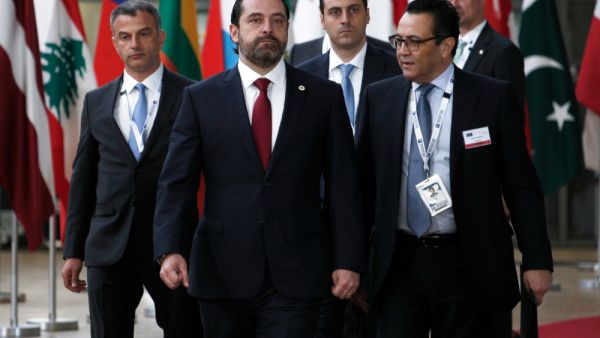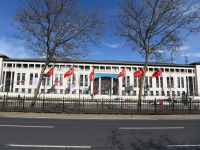Prime Minister-designate Saad Hariri Tuesday denied that the process to form a new Cabinet was back to square one but admitted challenges remained and called on all parties to make concessions.
Hariri’s comments came a day after his draft Cabinet formula failed to gain the approval of President Michel Aoun, who voiced a number of reservations over the allocation of ministerial posts to some parties.
Aoun’s reservations, which appeared to bring the Cabinet formation bid to a new deadlock, centered mainly on the Cabinet shares allotted to the Lebanese Forces and the Progressive Socialist Party, a political source said.
Dealing a further blow to Hariri’s draft proposal for a 30-member national unity government representing all the political parties, the Free Patriotic Movement founded by Aoun rejected the Cabinet formula altogether, saying that the prime minister-designate put it forward just for the sake of presenting it.
Speaker Nabih Berri expressed his dissatisfaction with the new complication in the government formation attempts. “Everyone without exception is required to make sacrifices and work for the country’s interest,” visitors at the speaker’s Ain al-Tineh residence quoted Berri as saying. Berri said he insisted that Parliament should legislate in isolation of the government formation issue.
Despite the gloomy picture, Hariri sounded optimistic that the new government would eventually be formed. “I don’t think we are back to square one. I am still waiting for further consultations with the president,” Hariri said after chairing the weekly meeting of the Future Movement’s parliamentary bloc at his Beirut Downtown residence.
Asked to comment on Aoun’s “observations” over the Cabinet formula, Hariri said: “If the observations are debatable, we will talk about them. But the problem is that there are always some who think negatively in the country. I think we have to start from positive matters and we should calm down a bit.”
Hariri stressed that the government would eventually be formed. “Even if this [Cabinet] formula was presented to the Future Movement itself, it would reject it. But we make sacrifices for the sake of the country and its interest. If each one of us was humble and gave priority to the interest of Lebanese citizens, we would have been able to form the government today.”
Responding to a statement issued by the FPM’s parliamentary Strong Lebanon bloc after its weekly meeting chaired by its head caretaker Foreign Minister Gebran Bassil which said that Hariri presented the Cabinet formula merely for the sake of presenting it, the prime minister-designate said: “The formula is with the president and I am the one who prepared it and gave it to the president. No third person interfered.”
“My prerogatives are clear in the Constitution. Period. This must not be a topic of discussion ... The dispute over [ministerial] portfolios is useless. If any political faction thinks it is bigger than the country or the country’s interest, than this is a problem,” Hariri said in what appeared to be an allusion to the FPM.
In Hariri’s Cabinet formula, Aoun and the FPM oppose granting four significant ministries to the LF that do not include a sovereign ministry or the post of the deputy prime minister. These include: The Public Works, Justice, Social Affairs and Culture Ministries, the political source said. The source added that Aoun wanted to substitute one of these ministries with a state ministry.
Similarly, Aoun and the FPM staunchly reject that the representation of the Druze sect be solely confined to ex-MP Walid Joumblatt’s Progressive Socialist Party as suggested in Hariri’s formula. Aoun and the FPM insist that MP Talal Arslan, Joumblatt’s Druze rival, be represented in the new government. Joumblatt insists on naming the three ministers reserved for the Druze sect in the new government.Aoun’s unfavorable response to Hariri’s Cabinet lineup prompted a fresh flurry of consultations aimed at narrowing rifts between feuding parties.
Hariri met at his residence with the LF’s caretaker Information Minister Melhem Riachi as a special envoy of LF leader Samir Geagea. A statement from Hariri’s office said the two discussed “latest developments ... in Hariri’s efforts to form a government."
Hariri later met with MP Teymour Joumblatt, head of the PSP’s parliamentary Democratic Gathering bloc, who was accompanied by MP Wael Abu Faour. “They discussed the political situation and the efforts to form the government,” a statement from Hariri’s office said.
“We stand by our demand regarding the Druze share in the government,” Joumblatt said after the meeting.
In what seemed to be a toughening of the LF position, LF MP George Adwan said his party would return to demanding five ministerial posts, including a sovereign ministry or the post of the deputy prime minister. “What happened and the delay in the formation of the government will harm [Aoun’s] presidency,” Adwan told MTV, referring to Aoun’s negative response to Hariri’s Cabinet formula.
The confusion and uncertainty caused by the Cabinet formula and the statement released by Aoun’s media office voicing “some observations” on the “principles and criteria” used to form the government sparked “a war of statements” between the Future Movement and the FPM centering on the prerogatives of the president and the prime minister-designate in forming the government.
The FPM’s Strong Lebanon bloc said in a statement after its weekly meeting that it considered Hariri’s Cabinet formula as being presented for the sake of presenting it and warned against any attempts to infringe on the president’s prerogatives.
“The bloc rejects the monopoly of sects’ representation because this is against democracy. That’s why a proportional system was adopted to represent everyone,” MP Ibrahim Kanaan said after the bloc’s meeting.
“The bloc sees that there is an attempt to abort the results of the [May 6] parliamentary elections and not to respect them,” he said. “There is an attempt to infringe on the president’s prerogatives and pre-empt his role under the pretext of the Taif [Accord].”
Aoun has long called for a set criteria to be used across the board in determining how many ministers each party gets.
In what appeared to a response to Aoun, Hariri stressed that the criteria for the formation of governments are determined by the Constitution and the rules set forth in the Taif Accord, “and that any other opinion remains within the framework of political views and stances placed at the disposal of the prime minister-designate.”
“Therefore, there is no reason to provoke confusion and debate again on matters related to the constitutional prerogatives, especially that Prime Minister Hariri said that he agrees with the president of the republic on the mechanisms adopted in accordance with the Constitution,” said a statement released after the Future Movement meeting.
This article has been adapted from its original source.








